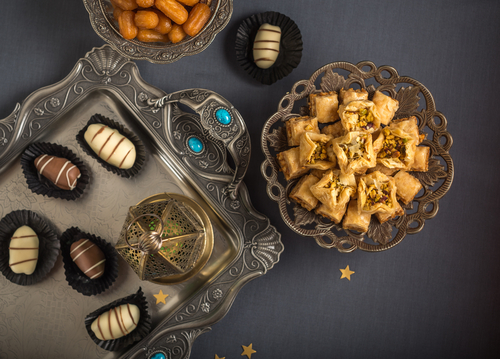What is Eid?

Eid is a joyous occasion or festival, and in Islam, there are two.
Each Eid celebration marks a very important event in history and commemorating these events is honoured by Muslims around the world. This three-day celebration begins after the Eid morning prayers. These two joyous occasions are respectively known as Eid-ul-Fitr and Eid-ul-Adha. The Arabic translation of the word ‘Eid’ means rejoicing, and the Holy Prophet (PBUH) said: “These are the joyous days of eating, drinking, and remembering Allah (SWT).”
The Concept of Eid
It is said that when the Holy Prophet Muhammad (PBUH) began migration from Makkah to Madinah, the people of Madinah had the tradition of celebrating two festivals. There were festivities and carnivals on these two days.
When the Holy Prophet (PBUH) inquired about these festivals, he was told that they had been celebrated since before Islam. The Prophet Muhammad (PBUH) told them that “Instead of those two days, Allah (SWT) has appointed two other days which are far better; the days of Eid-ul-Fitr and Eid-ul-Adha.” (Hadith)
Eid-ul-Fitr
Eid-ul-Fitr is celebrated on the first day of Shawwal, the tenth month in the Islamic calendar. It concludes the Holy month of Ramadan, the month in which Muslims across the world fast from sunlight to sundown and spend most of their days in prayer and worship. It is a day filled with joy and a day for thanking Allah (SWT) for all that He has provided. Muslims celebrate the joy of their health, wealth, strength and the opportunities and obligations given to them by their Creator for their fasts and other noble deeds during the month of Ramadan.
Eid-ul-Adha
Eid-ul-Adha is celebrated on the tenth day of Dhu al Hijjah, which is the last month of the Islamic calendar. It marks the completion of Hajj, a pilgrimage compulsory of all Muslims at least once in their lifetime. During Eid-ul-Adha, Muslims perform the Qurbani festivities, remembering the great act of obedience of Prophet Ibrahim (A.S) and his son, Prophet Ismail (A.S).
Prophet Ibrahim was resolute in his obedience to Allah (SWT) and was willing to sacrifice his own son without question. However, Allah (SWT) being the All-Merciful saw to it that he sacrificed a goat instead; a tradition that is carried out every year by millions of Muslims today.
The days of Eid are special ones on which many choose to wear their best clothes, have a special breakfast with their loved ones and make their way to the Mosque for Eid prayers. On the prestigious occasion of Eid, it is good to unite and offer the prayers in a large congregation.
As the month of Dhu al Hijjah is upon us, Eid-ul-Adha is ever closer. Let us all join and help those who are less fortunate than us so that they can look to the next year with the same hope and determination. Donate your Qurbani with Islamic Help; may your Eid bring much prosperity, health, joy and success to you and your loved ones. Ameen.



